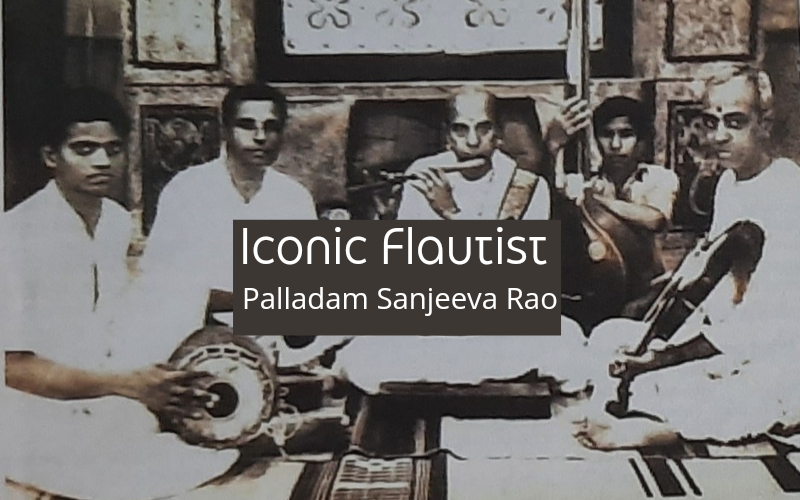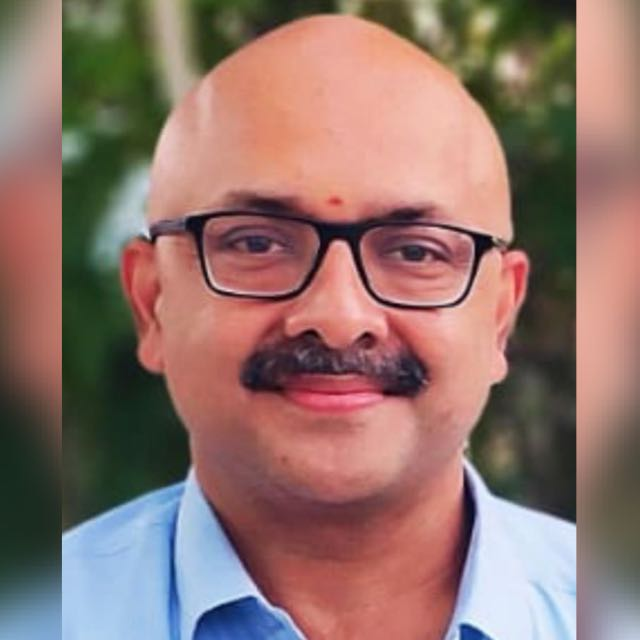
Sanjeeva Rao was the youngest of the three sons of Venkobhachariar of Palladam on the outskirts of Coimbatore. He belonged to an orthodox Madhwa Brahmin family. His father, a renowned Sanskrit scholar, was revered by the people for his deep piety and mesmeric powers. At that time, there lived a famous Carnatic vocalist, Shatkalam Salem Narassayya, who also happened to be a zamindar. Unfortunately, he became a victim of black magic and suffered due to the same.
Venkobhachariar removed the ill effects of black magic and a grateful Narassayya agreed to train Sanjeeva Rao and his brothers in Carnatic music. The brothers trained for a while and on the death of Narassayya they moved to Chennai and trained under Karur Devudu Aiyar in violin. Later they learnt under Sirkazhi Narayanaswamy Pillai.
One day Sanjeeva Rao and his brothers had an opportunity to listen to the blind flautist Sarabha Sastri (1872 – 1904). The entire family was impressed with the fantastic performance of Sarabha Sastri and moved over to Kumbakonam to learn from the great master.
Between 1897 and 1904 Sanjeeva Rao and his brothers mastered playing the flute under Sarabha Sastri. In spite of belonging to an influential family, the brothers lived on Unchavrittie (Singing and seeking food). Perhaps this act of theirs gave them excellent practice. The great master Sarabha Sastri unfortunately died early at the age of 32 years. However he had transferred his magical style to his able successor Sanjeeva Rao.
Thereafter, Sanjeeva was hailed as the real successor of Sarabha Sastri and over the next 15 years the world of music saw him attaining great heights. His assiduous application brought his name to the rank of expert musicians. Eventually, there was not a place in South India in which he was not held in high esteem for his masterly attainments and honoured both by aristocratic families and music associations across the country. He was second to none in his field. His was a continuous outpouring of his late master's talents through his magical flute.
P. V. Sanjeeva was known as the ‘Venu Gana Shiromani' of Southern India. The Colombia Gramophone Recording Company from London recorded his music and took it around the world. His rendition of ‘Ksheera Sagara Shayana' continues to be extremely popular. He was an important functionary of ‘Chinnakatchi,’ one of the two rival organizations which held the Thyagaraja Aradhana.
He began the flautists group rendition of ‘Chetulara' and this has continued year after year. Sanjeeva Rao perfected and elaborated the fingering system and popularized the flute as solo concert instrument. He was unrivalled for six decades. Dwaram Venkataswamy Naidu, the violinist, was in awe of Sanjeeva Rao and his musical abilities. He was awarded the Sangeetha Kalanidhi by the Music Academy in 1943. He was also the recipient of the Sangeetha Kala Shikamani.
Sanjeeva Rao was married to the granddaughter of the great dwaitha scholar, Madhwanatha Swamigal (1834 – 1931) and whenever he visited their home, particularly the residence of eminent chartered accountant D. V. Subbachar (Grandson of Madhwanatha Swamigal), he would flood the neighborhood with his divine music.
The family of Madhwanatha Swamigal built a brindavanam for him at Srirangam and began conducting an annual aradhana from 1932 onwards. The grandson D. V. Subbhachar would invite Sanjeeva Rao for the aradhana and he used to regularly perform at Srirangam before moving over to Thiruvaiyaaru for the annual fete, Sanjeeva Rao observed the ekadashi vrata regularly and attributed his success in music to this practice.
The Sangeet Natak Academy Award was known as the President’s award until the year 1954. The first recipients of this award were Mysore Vasudevachar and Palladam Sanjeeva Rao. The people of South India spent the whole year felicitating Sanjeeva Rao. Coimbatore was the first to do so for he was the son of the soil. The Akila Bharata Madhwa Maha Mandal held a procession and it culminated at the Gopalswami Temple.
There were three felicitations in the temple city of Kumbhakonam at the Bhajana Mutt by Violinist Rajamanickkam Pillai, Composer Papanasam Sivan, and Harikatha exponent Vadiraja Bhagavathar and also at the Vani Vilasa Sabha and Sadguru Thyaga Brahma Samajam. The Madhwa Mahajana Sabha felicitated him in Trichy and the Gayana Samaj followed suit in Bangalore. Another grand felicitation was held at the Sri Krishna Gana Sabha at Chennai in the presence of Bharat Ratna Dr. C. Subramaniam and Maharajapuram Santhanam.
The inimitable style of Sanjeeva Rao's music was taught by him to his students and Palladam Nagaraja was an exponent of the same. However, the intricate way of handling the flute like his master Sarabha Sastri was taught by Sanjeeva Rao to his famous disciple H. Ramachandra Sastri was associated with several great institutions and has performed in front of dignitaries including the Viceroy of India.
Sanjeeva belonged to a rare breed of committed musicians who lived long ago. His time at Coimbatore was always full of music. He was also known for his fine sense of humor. Telugu Brahmin Street in Coimbatore has indeed been fortunate for being infused with the maximum of his music. City elders continue to recall the divine music that flowed out of the flute of Sanjeeva Rao. The story of Sanjeeva Rao of the Greater Coimbatore Region is sure to motivate many a Coimbatorean to excel and entertain the world with divine music.
 Mr. Rajesh Govindarajulu is one of the founding members of the Verandah Club Pvt. Ltd. He is a leading columnist, historian, jeweler, entrepreneur, and a heritage enthusiast who is earnestly working to revive the past in the light of the present. Experiential learning about the history of Coimbatore is his main course of interest and he is also a panel member of many colleges in the city.
Mr. Rajesh Govindarajulu is one of the founding members of the Verandah Club Pvt. Ltd. He is a leading columnist, historian, jeweler, entrepreneur, and a heritage enthusiast who is earnestly working to revive the past in the light of the present. Experiential learning about the history of Coimbatore is his main course of interest and he is also a panel member of many colleges in the city.
NEXT ARTICLE